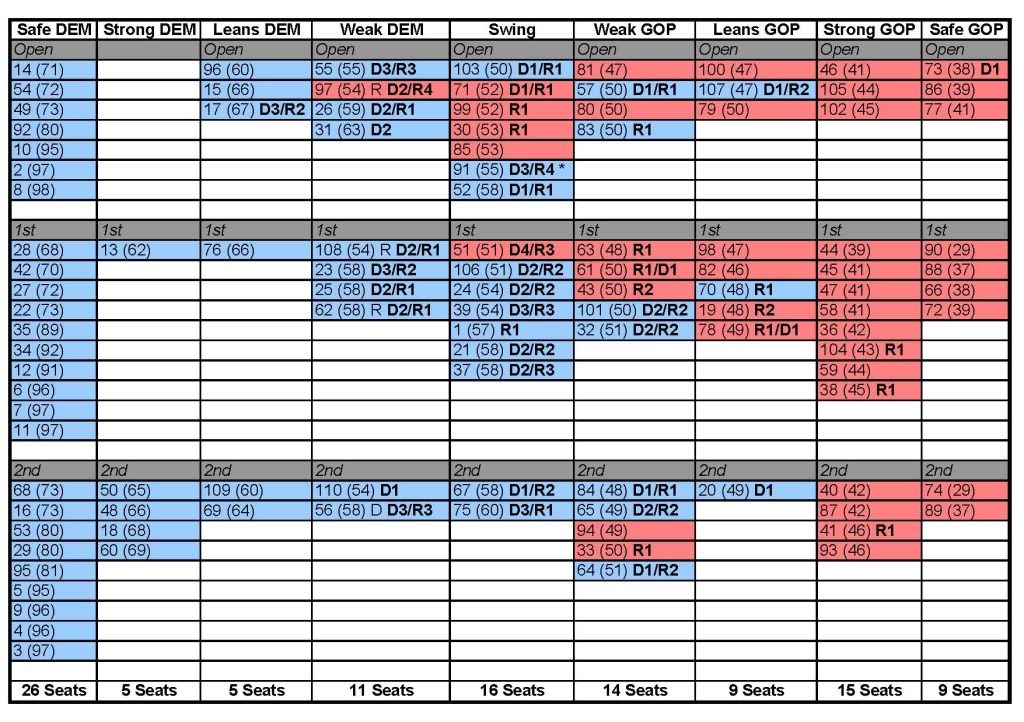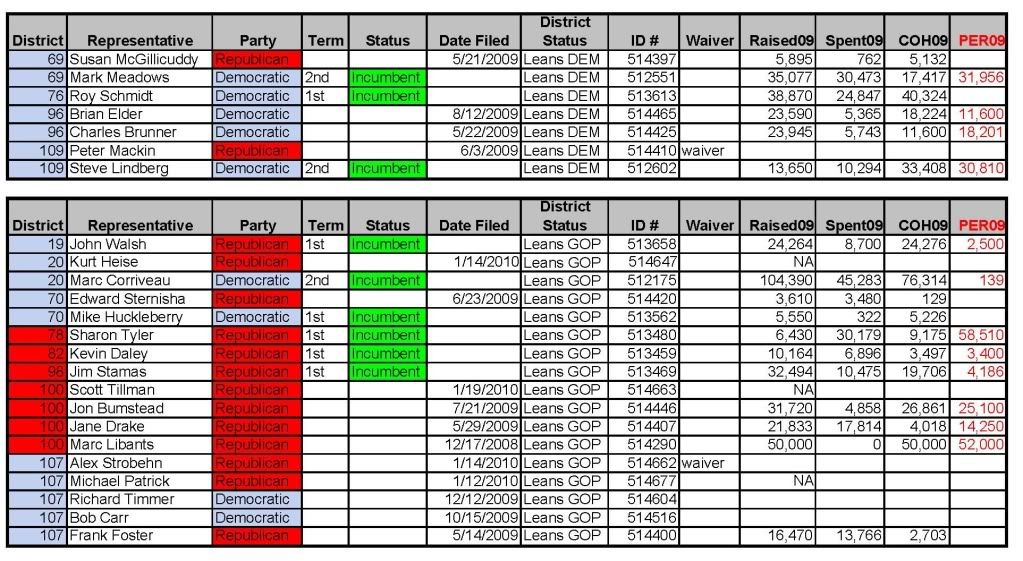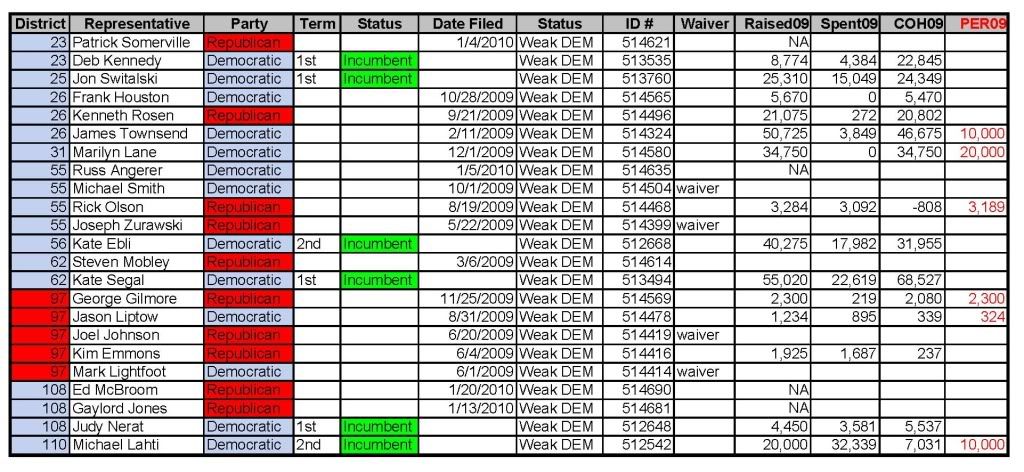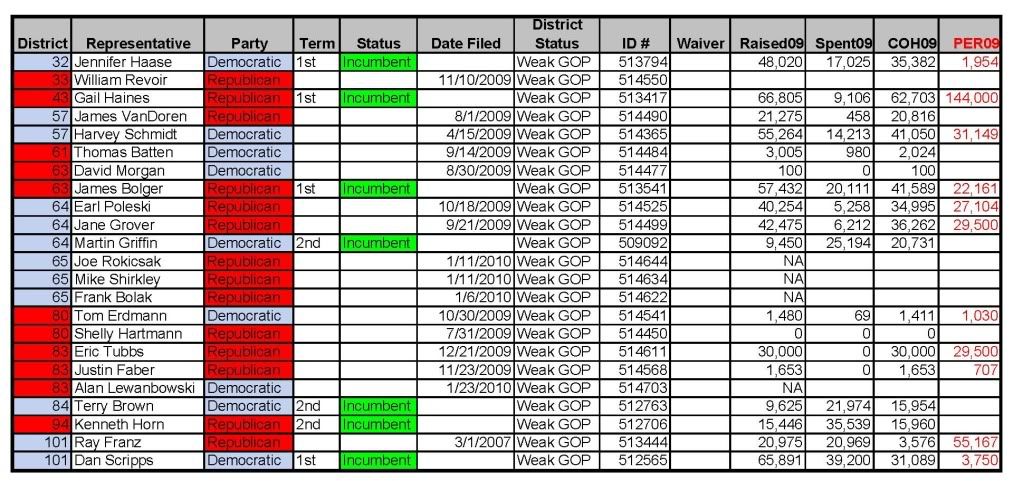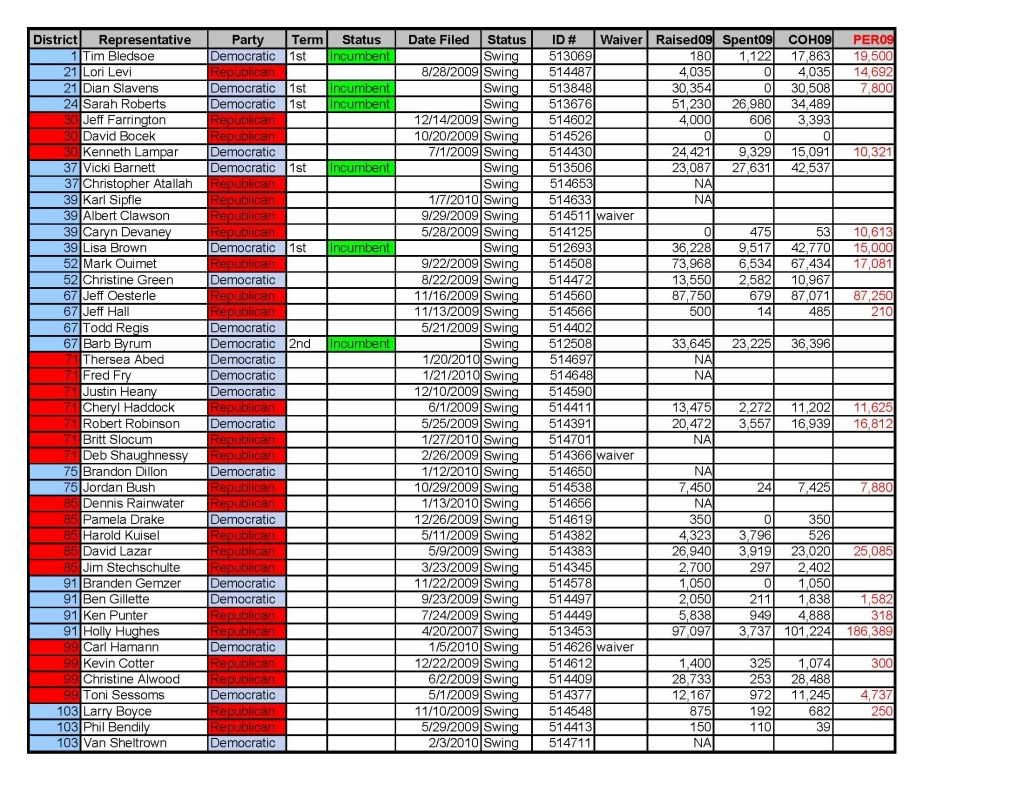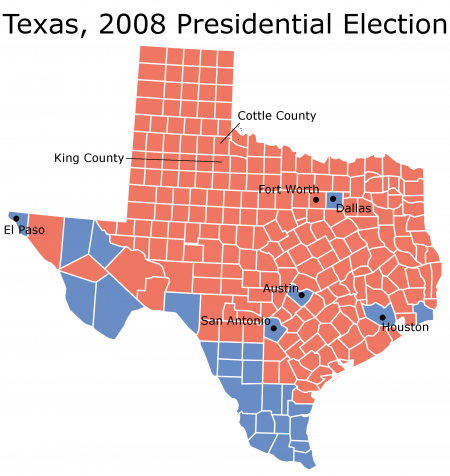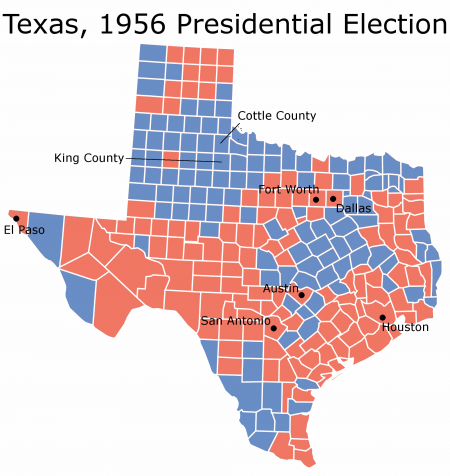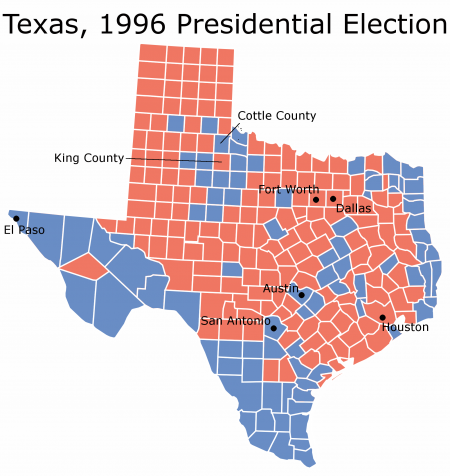• Election Results: With 99.1% of precincts reporting (97 remain, apparently mostly in Cook County), both sides of the governor’s race remain too close to call. Democratic incumbent Pat Quinn has declared victory, sitting on a 7,000 vote lead (50.4%-49.6%) and with the remaining precincts in Cook County likely to go his way, although Dan Hynes hasn’t conceded yet. On the GOP side, we’re looking most likely at a recount, as state Sen. Bill Brady leads fellow state Sen. Kirk Dillard currently by a 751-vote margin (20.3%-20.2%), as they both squeaked past the two presumed frontrunners, former state party chair Andy McKenna and former AG Jim Ryan. The fact that the remaining votes are from Cook County, however, may be poised to help the moderate suburbs-based Dillard, though, rather than the conservative downstate Brady, so this race seems likely to get even closer (Nate Silver actually projects a one-vote victory for Brady based on broader Cook County trends). Recount procedures make it sound like a protracted process – an initial vote tally won’t happen until March 5, and then the process “could take months to complete” – giving Quinn a big headstart on whoever the GOP victor turns out to be.
As expected, Alexi Giannoulias and Mark Kirk are the Senate nominees, although both won their races with somewhat underwhelming percentages (39% for Giannoulias, and 57% for Kirk, who could have been in more trouble had the teabagging right coalesced behind one person in particular). Conservatives did triumph over establishment candidates in several GOP House primaries, though, as Bob Dold! beat state Rep. Beth Coulson in the 10th, and state Sen. Randy Hultgren beat Ethan Hastert in the 14th.
In Florida, as expected, state Sen. Ted Deutch easily won the special election primary to succeed Rep. Robert Wexler, beating former Broward Co. Commissioner Ben Graber 86-15. It looks like he’ll face Republican Ed Lynch (the 2008 nominee), who defeated Joe Budd by only 46 votes (but with only 8,000 total GOP votes, that’s outside the margin for an automatic recount). And here’s a surprise out of Kentucky: Democrats picked up a state House seat in the dark-red HD 24, which was recently vacated when Republican Jimmy Higdon got promoted to the state Senate in another special election. Terry Mills won, 54-46, based on an overwhelming edge (89-11) on his home turf of Marion County, reminding us that, at the end of the day, all politics is local.
Finally, last night was caucus and straw poll night in Minnesota. Only 80% of precincts have reported yet – I guess they go to bed early in Minnesota – but the straw poll in the Democratic governor’s race points to only a lot of chaos at this point. Minneapolis mayor R.T. Rybak led with 21.8%, followed closely by state House speaker Margaret Anderson Kelliher at 20.2%. However, “uncommitted” is a solid 3rd at 15%, there are five other candidates who managed to break 5% (John Marty, Tom Rukavina, Paul Thissen, Matt Entenza, and Tom Bakk), and ex-Sen. Mark Dayton doesn’t even seem to be bothering with the whole process, planning on going straight to the primary, so there’s not much clarity on how the field will shake out. The GOP field seems much more clear-cut, where former state House minority leader Marty Seifert beat state Rep. Tom Emmer 50-39, with the rest of the field in the low single digits.
• AZ-Sen: With the imminent entry of ex-Rep. J.D. Hayworth into the Republican primary against John McCain, we’re already looking at dueling internal polls. McCain offers up a poll from POS, giving him a 59-30 lead over Hayworth. Hayworth has his own poll from McLaughlin, which, not surprisingly, shows him much closer, trailing 49-33.
• FL-Sen: Kendrick Meek, NASCAR dad? Meek plans to call attention to his campaign by shelling out to be the lead sponsor of Mike Wallace’s car in an upcoming race at Daytona.
• IN-Sen: With the surprising announcement by ex-Sen. Dan Coats last night that he’s interested in a comeback and would start seeking the signatures to qualify for the Indiana GOP nod, the oppo pretty much writes itself. For starters, Coats can’t even sign his own petition – he’s been a registered voter in Virginia for more than a decade, not Indiana. And what’s he been doing for much of that time? Lobbying… for King & Spalding, on behalf of nice people like the Carlyle Group and Bank of America. The Plum Line also points to Coats accusing Bill Clinton of “wagging the dog” when he started going after al-Qaeda in 1998, allegedly to distract the press from his peccadilloes… and we all know how that turned out.
• ND-Sen: Democrats have, well, somebody ready to go if ex-AG Heidi Heitkamp doesn’t get into the Senate race to replace retiring Byron Dorgan. State Sen. Tracy Potter, who represents Bismarck, will be announcing his candidacy on Friday. Other potential candidates seem to be holding back, waiting to see what Heitkamp does; she’s been strangely silent since initially expressing interest in the seat last month.
• NY-Sen-B: Quinnipiac’s first poll of the New York Senate race after the Harold Ford Jr. boomlet began finds, well, pretty much what everyone else has found: Kirsten Gillibrand beats him by a wide margin but doesn’t break 50%. Gillibrand beats 36-18, with Jonathan Tasini at 4. Quinnipiac also tests general election matchups against Republican port commissioner Bruce Blakeman (they don’t even bother testing ex-Gov. George Pataki, who doesn’t seem to be making any moves to get into the race). Gillibrand beats Blakeman 44-27, and Ford beats him 35-26. Gillibrand is slowly gaining some more name rec, up to a 42/28 approval. Blakeman may not have the GOP primary to himself, though, as a strange blast from the past is re-emerging to say he’s interested in the race: ex-Rep. Joseph DioGuardi. In case the name doesn’t ring a bell, DioGuardi served in the House representing Westchester County from 1984 to 1988, when he was defeated by Nita Lowey.
• NY-Gov: The same Quinnipiac sample looks at the governor’s race, finding huge approval gaps between Andrew Cuomo (54/16) and David Paterson (34/49). Cuomo wins the Democratic primary 55-23. Cuomo beats Rick Lazio 57-25, while Lazio manages to get past Paterson 40-39. There’s also one other bit of good news for Cuomo (who’s seemed gunshy about taking on Paterson, perhaps out of bad memories of his race against Carl McCall). The poll asked if his candidacy would be “racially divisive,” and respondents answered “no” by an 80-14 margin, including 73-22 among African-Americans. Marist (pdf) also just released the gubernatorial half of its recent Senate poll, finding generally similar numbers. Cuomo wins the primary 70-23. Cuomo beats Lazio 64-27, while Lazio edges Paterson 46-43.
• TN-Gov: Add one more candidate running for higher office who’s publicly copped to being birther-curious: Lt. Gov. (and GOP gubernatorial candidate) Ron Ramsey. Not having made much of an impression in terms of polling (where Rep. Zach Wamp has an edge) or fundraising (where Knoxville mayor Bill Haslam is cleaning up), this seems like the most attention Ramsey has gotten so far.
• TX-Gov: Here’s more evidence that the Texas GOP gubernatorial primary may be headed for a runoff: the new Rasmussen poll of the primary doesn’t have anyone coming even close to 50%. Incumbent Rick Perry leads at 44, with Kay Bailey Hutchison lagging at 29, and Paulist insurgent Debra Medina all the way up to 14 on the strength of some buzz coming out of her debate performances. KBH may be counting on a runoff as her only way left to salvage this race, but somehow it seems like, in a runoff, Medina votes are a lot likely to gravitate toward the secession-invoking Perry rather than consummate DC insider Hutchison. In the general, all three defeat Democratic ex-Houston mayor Bill White, although, as one would expect, KBH puts up the biggest margin: 49-36. Perry wins 48-39, while Medina wins by only 41-38.
• AR-02: One of the non-Tim Griffin candidates in the Republican field, David Meeks, dropped out of the race today, probably realizing he was in over his head with the kind of attention open seat races get. One other candidate, restaurant owner Scott Wallace remains, and he may well carry the teabagger flag against Beltway creature Griffin. Realizing the best way to win this is by painting Griffin as insider, the DCCC is turning their attention to Griffin’s past as GOP behind-the-scenes fixer, calling attention to his efforts at voter suppression. Over in the diaries, ARDem takes a look at the developing Dem field, which currently contains state House speaker Robbie Wills, liberal state Sen. Joyce Elliott, and retiring Vic Snyder’s chief of staff, David Boling. It won’t contain, however, Little Rock mayor Mike Stodola, or Public Service Commissioner Paul Suskie, who had seemed to be laying the groundwork for a run.
• CA-12, CA-AG: False alarm: Rep. Jackie Speier is staying put in the 12th District, where’s she been in place for only a couple years. Rumors that she was about to move over to the state AG’s race had many of the state legislators on the Peninsula angling to replace her.
• GA-04: In the wake of an internal from Rep. Hank Johnson showing him crushing his three opponents in the Dem primary in this solidly-blue district in Atlanta’s suburbs, one of those opponents got out of the way: DeKalb Co. Commissioner Lee May. May is an ally of former DeKalb Co. CEO Vernon Jones, so it’s possible that he’s getting out of the way primarily so that Jones can get a bigger share of the non-Johnson vote.
• MA-10: With the general sense that this is the most vulnerable district in Massachusetts (as seen with its votes in the Senate special election last month), Republicans are taking more of an interest in challenging Rep. William Delahunt in this usually-ignored seat. Former state treasurer Joe Malone is probably the biggest name to express interest, but at least one other credible contender, state Rep. Jeffrey Perry, is already announcing his candidacy. State Sen. Robert Hedlund is also expressing some interest.
• NJ-07: One big hole in the Dems’ recruitment schedule has been the 7th, narrowly won by freshman GOP Rep. Leonard Lance in 2008. They’ve managed to fill the gap with Ed Potosnak, who’s elevated slightly above Some Dude status by the full Rolodex he brings with him after working for a number of years as a Hill staffer for Rep. Mike Honda.
• PA-11: Lackawanna Co. Commissioner Corey O’Brien has a compelling argument for why he should win the primary in the 11th: he says Rep. Paul Kanjorski has “zero” chance of defeating Republican Lou Barletta in their third face-off, citing Kanjorski’s low approval ratings. O’Brien has been fundraising well ($180K last quarter, not far from Kanjo’s $237K) and recently hit the airwaves with a small cable buy for his first TV spot.
• CA-LG: Is San Francisco mayor (and gubernatorial race dropout) Gavin Newsom actually thinking about a run for the dead-end job that is California’s #2? Officially he’s not interested, but he hasn’t said no, and a new public poll from Tulchin gives him a big lead in a hypothetical LG primary, with Newsom at 33 against the two declared candidates: Los Angeles city councilor Janice Hahn at 17 and state Sen. Dean Florez at 15. Meanwhile, the state Senate this week takes up the issue of filling the current vacancy in the LG’s chair (vacated by now-Rep. John Garamendi); there’s actually talk of blocking Ahnold appointee state Sen. Abel Maldonado, despite that getting the moderate Republican Maldonado out of his seat would open up his Dem-leaning district for a takeover and help push the Dem edge in the Senate toward the magic 2/3s mark.
• CT-AG: The story of Susan Bysiewicz just gets stranger and stranger; she decided that rather than run for governor, she’d prefer to run for AG, but now the job’s current occupant, Richard Blumenthal, says that possibly she can’t. An AG opinion interprets state law requiring ten years of legal practice as unclear and urges a declaratory ruling on Bysiewicz’s case from a court. Bysiewicz, for her part, said she won’t seek the declaratory ruling and is simply plowing ahead with her AG campaign, although it’s possible one of the other candidates in the race might force the issue in the courts.
• Polltopia: The skepticism toward those SurveyUSA polls commissioned by Firedoglake continues to grow, this time from political science professor and frequent Pollster.com contributor Alan Abramowitz. His gravest concerns are with the leading questions in the issues portions of the poll on health care reform, but he also points to serious problems with the samples’ compositions that we were quick to flag. He observes that the samples deeply underrepresent younger votes, and that the youth subsets are so small that there’s no good way to “weight up” younger voters to a more proportionate level.
